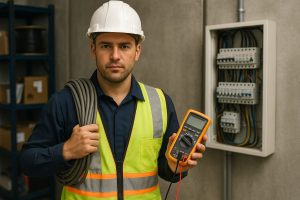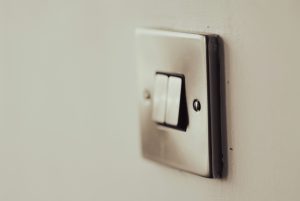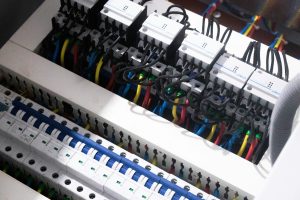Becoming an electrician in the UK is a smart move as there’s consistent demand, great pay, and a clear progression path. Whether you’re fresh out of school or looking to change careers, the steps are laid out and achievable with the right guidance.
Understanding the Role of an Electrician
Electricians are skilled tradespeople who design, install, inspect, and maintain electrical systems in homes, businesses, factories, and public spaces. They play a vital role in ensuring safety, energy efficiency, and the reliable operation of electrical infrastructure. The job isn’t just about wiring up sockets or installing lights; it involves interpreting technical drawings & adhering to legal and safety standards.
Electricians work with a wide range of equipment such as cables, distribution boards, switches, sockets, and more. They use specialised tools like multimeters, circuit testers, and insulation resistance testers to check that installations are safe and working properly. In a world increasingly reliant on technology, electricians also deal with modern systems such as electric vehicle charging points, smart homes, and renewable energy systems.
The UK has strict regulations in place to ensure that electrical work is done safely. Electricians must follow the standards set out in the IET Wiring Regulations (BS 7671), and in many cases, they need to be registered with a competent person scheme like NICEIC or NAPIT to carry out certain types of work legally.
The role isn’t just technical, it’s also customer-facing. You’ll need to communicate clearly with clients, explain work being done, and sometimes manage expectations around cost, time, and disruption.
What Does an Electrician Do?
An electrician’s responsibilities vary based on their work setting and specialisation, but here are the core tasks most will perform:
- Reading technical diagrams and blueprints
- Installing new electrical systems or components
- Testing and inspecting existing systems
- Diagnosing faults and performing repairs
- Ensuring compliance with UK building and wiring regulations
- Providing cost estimates and timelines to clients
Electricians also work in hazardous environments, tight spaces, heights, and construction zones. So a strong awareness of health and safety is vital. PPE (personal protective equipment) like gloves, goggles, and safety boots are also essential.
Types of Electricians in the UK
Electricians often specialise in one of three main areas:
- Domestic Electricians – These work primarily in homes, installing and maintaining household wiring, sockets, lights, and consumer units. This is often the first route for many entering the trade.
- Commercial Electricians – These professionals work in commercial settings like offices, schools, and shops, where the scale and complexity of the systems are greater than in domestic environments.
- Industrial Electricians – This role involves working in factories and plants, dealing with large machinery, control panels, and three-phase power systems. It’s one of the most complex branches of electrical work.
Some electricians also choose to specialise in inspection and testing, fire alarm systems, CCTV and security, or renewables such as solar and electric vehicle charging stations.
Is Becoming an Electrician the Right Career for You?
Before jumping into any training, it’s important to assess if becoming an electrician aligns with your interests, skills, and long-term goals. This career isn’t just about having a steady job; it’s also about committing to ongoing learning, working in dynamic environments, and taking responsibility for safety-critical systems.
Being an electrician can be physically demanding. You’ll often work in confined spaces, at heights, or outdoors in varying weather conditions. But it can also be incredibly rewarding, both financially and personally.
Skills and Attributes You’ll Need
Here are some key traits and skills that successful electricians share:
- Attention to detail – A small mistake can have big consequences.
- Problem-solving ability – You’ll regularly diagnose and fix faults.
- Manual dexterity – Handling wires and tools with precision is essential.
- Strong maths and technical understanding – Calculations and reading schematics are part of the job.
- Physical fitness – The work is active and sometimes strenuous.
- Customer service skills – Especially important for self-employed or domestic electricians.
- Time management – Deadlines can be tight, especially on building sites or with emergency call-outs.
If these traits sound like you, you’re off to a great start.
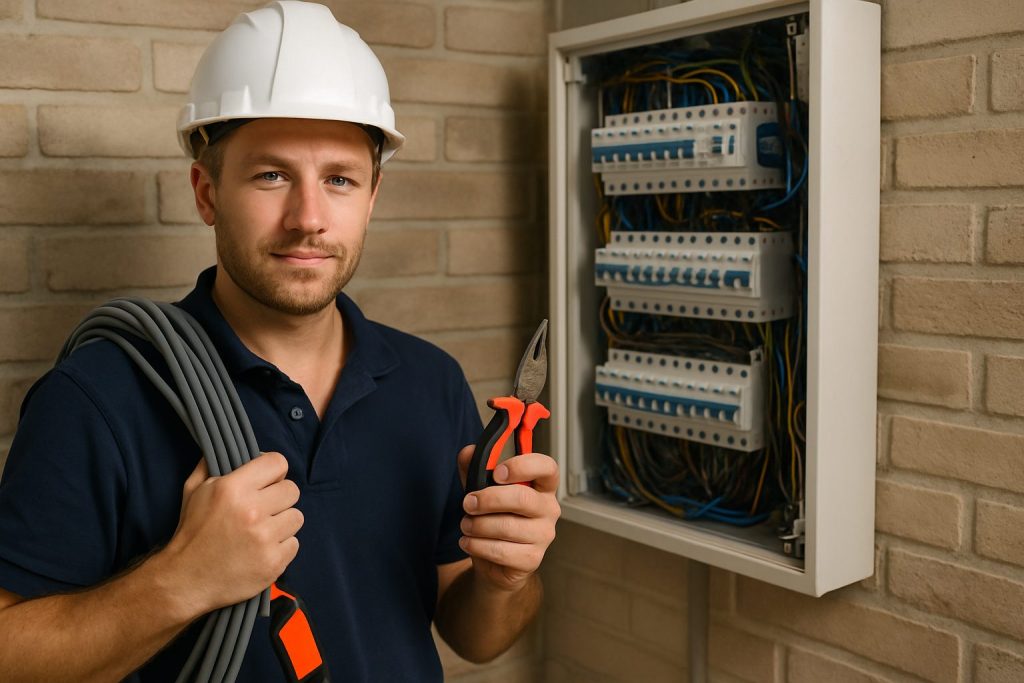
Educational Requirements to Become an Electrician
To become a qualified electrician in the UK, you’ll need a combination of technical education and on-the-job experience. There are a few different routes to get there, but they all require commitment and study.
GCSEs and Basic Qualifications
Most training providers and employers will expect you to have a minimum of Grade 4/C or above in GCSE Maths and English. Science is also beneficial, particularly Physics, as it helps you understand electrical principles more easily.
If you don’t have these GCSEs, don’t worry, as you can often take equivalent functional skills qualifications or study them alongside your electrical training.
Strong GCSEs give you a head start in understanding the theory and calculations required in electrical work. These include:
- Ohm’s Law and electrical formulas
- Power, voltage, current, and resistance
- Cable sizing and circuit design
- Safety codes and regulations
Choosing the Right Training Route
There are two main pathways to becoming a fully qualified electrician:
- Apprenticeship Route – The most popular and employer-backed method. You’ll work full-time with an employer and attend college one day a week.
- College + NVQ Route – Ideal for adult learners or those not currently employed in the trade. You’ll study full-time and later complete an NVQ when you’ve found a job or work placement.
Both routes eventually lead to the same goal of becoming a qualified electrician capable of registering with a competent person scheme, getting your ECS Gold Card, and legally working on installations in the UK.
Apprenticeship Route: Learn While You Earn
An apprenticeship is the most structured and supported way to become an electrician. It’s designed for those who want to enter the trade with minimal financial disruption, as your employer pays you while you learn.
What is an Electrical Apprenticeship?
In the UK, electrical apprenticeships usually follow the Installation & Maintenance Electrician (ST0152) standard. This is a Level 3 qualification, which combines on-site training with classroom-based learning.
You’ll learn:
- Electrical theory and principles
- Installation practices
- Inspection and testing
- Health and safety regulations
- Building codes and standards
The apprenticeship typically lasts 3.5 to 4 years, and at the end, you’ll take the AM2S assessment, which is a practical test of your knowledge and skills.
How to Find and Apply for Apprenticeships
To get started, check out:
- Gov.uk Apprenticeship Finder
- Local colleges and training centres
- Electrical contractors or local firms
- Job boards like Indeed or Reed
Having a strong CV and showing initiative by contacting employers directly can also boost your chances.
College Courses and NVQ Qualifications
If you’re unable to secure an apprenticeship right away, don’t worry, as the college route is an excellent alternative. Colleges across the UK offer diplomas in electrical installation that set you up for completing an NVQ once you gain industry experience.
Level 2 and Level 3 Diplomas
The typical college route begins with a City & Guilds 2365 Level 2 Diploma in Electrical Installations. This is a classroom-based course that introduces you to electrical principles, wiring regulations, and safe working practices. It’s the ideal entry point for anyone brand new to the trade.
Once completed, most learners progress to the City & Guilds 2365 Level 3 Diploma, which digs deeper into complex installations, fault-finding, and testing. While both levels are classroom-based and don’t include onsite assessments, they’re designed to prepare you for real-world electrical work and give you a significant edge when applying for jobs or work placements.
Here’s what you’ll typically cover across both levels:
- Electrical science and principles
- Installation practices and theory
- Health and safety in construction
- Understanding building regulations
- Inspection, testing, and fault diagnosis
- Working with wiring systems and components
The Level 3 Diploma is often required before you can begin your NVQ assessments, so completing both stages is crucial for long-term success.
NVQ Level 3 Electrical Installation
After completing your Level 2 and 3 diplomas, the next step is achieving the NVQ Level 3 in Electrical Installation (City & Guilds 2357 or 2346-03 for experienced workers). The NVQ proves your competence on the job and is essential for becoming a fully qualified electrician.
Unlike the diplomas, this qualification is based entirely on practical work. You’ll need to:
- Build a portfolio of real-life jobs you’ve completed
- Be assessed onsite by a qualified assessor
- Demonstrate safe working practices, quality installations, and adherence to regulations
The NVQ isn’t something you can do in a classroom—it requires employment or at least a work placement with an electrical contractor.
If you’ve worked in the trade for years but never got officially qualified, the Experienced Worker Route (2346-03) allows you to achieve your NVQ faster by recognising your prior learning and work history.
Completing the NVQ is a critical milestone on the road to becoming a fully qualified electrician and is often the final requirement before you take the AM2 assessment and apply for your ECS Gold Card.
Not only does hands-on experience develop your skills, but it also helps you build a professional reputation and network—crucial if you plan to go self-employed one day.
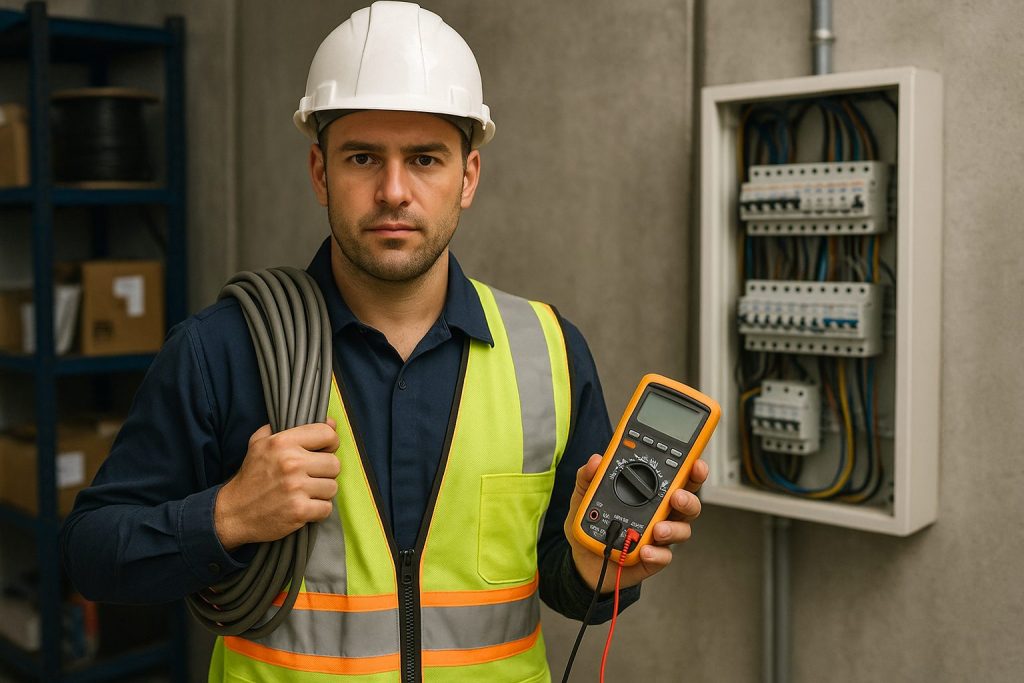
Getting Certified and Becoming a Qualified Electrician
Once you’ve completed your education, gained practical experience, and passed your NVQ, the final step is becoming fully certified. This involves taking the AM2 assessment and securing your ECS Gold Card, which proves you’re competent and qualified to work independently in the UK.
The AM2 Assessment
The Achievement Measurement 2 (AM2) is a rigorous, practical assessment that tests your ability to work safely and effectively as an electrician. It’s the final requirement for most qualifications and is usually completed at the end of your apprenticeship or NVQ.
The test takes around 2½ days and includes:
- Safe isolation procedures
- Installation of electrical circuits and systems
- Inspection and testing
- Fault diagnosis and rectification
- Understanding and application of wiring regulations
It’s a high-pressure exam, but if you’ve paid attention during your training and gained solid on-site experience, you’ll be well prepared. Some training providers offer mock AM2 assessments or preparation workshops which are worth attending.
Once you pass the AM2, you’re officially considered a qualified electrician in the UK.
Becoming a Gold Card Electrician
After passing your AM2 and completing your qualifications, you can apply for the Electrotechnical Certification Scheme (ECS) Gold Card. This card is recognised across the UK as proof that you’re a fully qualified, competent electrician.
The ECS Gold Card shows:
- You’ve achieved a Level 3 qualification (NVQ)
- You’ve passed the AM2 test
- You’re up to date with health and safety (via the ECS H&S test)
- You’re eligible to work unsupervised on electrical systems
Many employers and clients now require electricians to hold a Gold Card before hiring them, especially on commercial or industrial sites.
To apply, visit the ECS website, provide proof of your qualifications, and take a short Health, Safety & Environmental Assessment.
Registering with a Competent Person Scheme
If you want to carry out electrical work in homes (domestic settings) in England or Wales and self-certify your work, you’ll need to join a Competent Person Scheme. This is a legal requirement under Part P of the Building Regulations for certain types of notifiable work.
Why Registration Matters
By joining a Competent Person Scheme, you gain the ability to:
- Sign off on your own work without needing a local authority inspection
- Issue certificates to clients for insurance and legal purposes
- Prove compliance with building regulations
- Boost your reputation as a professional
This is particularly important if you’re going self-employed or starting your own business. Homeowners are far more likely to hire someone who’s registered and can legally sign off on work.
Top Certification Bodies in the UK
There are several schemes approved by the government. Here are the most popular:
- NICEIC (National Inspection Council for Electrical Installation Contracting) – Arguably the most recognised certification body in the UK.
- NAPIT (National Association of Professional Inspectors and Testers) – Popular with domestic installers and small firms.
- ELECSA – Previously part of the ECA, now merged with NICEIC.
- Stroma – Specialises in energy efficiency and domestic services.
To register, you’ll need:
- Proof of qualifications and experience
- Up-to-date public liability insurance
- A successful assessment of your work by the scheme provider
Once registered, you’ll appear in public directories, gain access to ongoing training and support, and be able to market yourself as a compliant, trusted professional.
Salary Expectations
Here’s a general breakdown of earnings:
| Experience Level | Average Annual Salary (2025) | Notes |
|---|---|---|
| Apprentice | £10,000–£20,000 | Earn while you learn |
| Newly Qualified | £26,000–£34,000 | With NVQ and AM2 |
| Experienced Electrician | £35,000–£45,000+ | Can exceed £50K in London |
| Specialist Contractor | £45,000–£60,000+ | EV, Solar, Inspection & Testing |
| Self-Employed (High-End) | £50,000–£80,000+ | Depends on clients, location, skills |
Self-employed electricians can make significantly more, especially if they run a team, take on commercial contracts, or specialise in premium services.
Final Thoughts on Becoming an Electrician in the UK
Becoming an electrician in the UK isn’t just about learning how to wire up a socket or change a fuse board; it’s about stepping into a lifelong trade with strong earning potential, endless growth opportunities, and the chance to make a real impact in people’s homes and businesses.
It doesn’t matter if you go down the apprenticeship route or start with college courses; the ultimate goal is to achieve your Level 3 NVQ, pass your AM2, and secure your ECS Gold Card. From there, you can take your career in any direction.
Do electricians need a driving license in the UK?
It’s not a legal requirement, but it’s highly recommended. Most electrical jobs are site-based, and you’ll need to transport tools and materials. Many employers will require a full UK driving license, especially for mobile roles.
What tools do I need to start as an electrician?
Basic tools include:
Screwdrivers (insulated)
Pliers, side cutters
Voltage tester
Cable stripper
Hammer, tape measure, level
Multifunction tester (for inspection & testing)
As you progress, you’ll invest in more advanced tools like drills, cable rods, and test kits.
Is it worth becoming an electrician in the UK?
Absolutely. It’s one of the most in-demand skilled trades, with strong earning potential, job security, and the flexibility to be your own boss. With the growth of smart homes, EVs, and green energy, the future for electricians looks even brighter.
Can I become an electrician without an apprenticeship?
Yes. You can start with Level 2 and Level 3 diplomas at college, then complete an NVQ once you have a job or placement. This is a common path for adult learners or career changers who can’t commit to a full apprenticeship right away.
How long does it take to become a qualified electrician in the UK?
On average, it takes 3.5 to 4 years to become fully qualified if you’re completing an apprenticeship. If you take the college route followed by an NVQ and AM2, it may take slightly longer, especially if you’re working part-time or fitting studies around another job.

